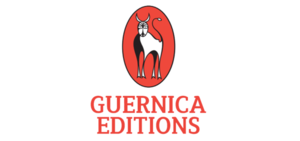Guernica Editions Celebrates 40 Years of Literary Innovation with New Events, Imprint & Prize
Guernica Editions is one of Canada's oldest, most prestigious independent publishing houses, having steadily published literary fiction, non-fiction, and poetry for a whopping four decades. Their apt motto is "No Borders, No Limits". Some of the their authors, editors, and translators have included Jim Johnstone, Sandy Pool, and the late Priscila Uppal, amongst many others.
We're excited to celebrate Guernica's milestone 40th anniversary with them. Today we're speaking with Michael Mirolla, Guernica Publisher and Editor-in-Chief, about the history of the press, his time there, and what is next for the venerable house.
He tells us about what they have planned to celebrate 40 years (including events and a brand new literary prize), the press's focus on diversity from its earliest days, and what constitutes a "Guernica Book".
Open Book:
How does it feel to reach such a huge milestone? Will you be celebrating in any way?
Michael Mirolla:
Naturally, to have lasted 40 years as an independent publishing house in Canada is an achievement we’re very proud of, especially considering what it takes to survive in this type of cultural/social/technological environment. And we’re definitely going to celebrate the achievement with events in three cities: Ottawa on October 17; Toronto on October 27 at the Harbourfront Centre as part of the International Festival of Authors; and in Montreal on November 14. As part of the Toronto event, we’ll be announcing the winner of the inaugural Guernica Prize for literary fiction.
OB:
Tell us a little bit about the founding and early days of Guernica.
MM:
Guernica Editions was founded in Montreal in 1978 by Antonio D’Alfonso. His motivation was his concern that the Canadian publishing industry did not adequately represent the diverse nature of the country and the authors within it. He also wanted to cross the language barrier between authors who wrote in French and the larger English-language Canadian audience. Among the first books published were poetry collections by Marco Fraticelli, Barry Dempster, Mary Melfi, Rhea Tregebov and Fred Cogswell.
OB:
What prompted the choice of "Guernica Editions" as the house's name?
MM:
The name comes from a visit that Antonio D’Alfonso took to the Spanish village that was the subject of Picasso’s famous painting, commemorating the bombing of the village during the Spanish Civil War. When my partner and I took over the press in 2009, it was decided to keep the name, both for its historical significance and for the fact it represented the type of books we wanted to publish.
OB:
What is unique about Guernica's list? How would you describe a "Guernica book"?
Your CanLit News
Subscribe to Open Book’s newsletter to get local book events, literary content, writing tips, and more in your inbox
MM:
When Guernica became available, my partner and I decided to take it on because it was Guernica. Because of what Guernica had stood for during all those decades. Because of what the publishing house had achieved in terms of advancing certain ideas and principles that other publishing houses in Canada had not picked up on – or felt weren’t worth their while. Among other achievements, Guernica was the first press in Canada to consciously feature a multicultural (the trendy term now is pluri-cultural) blend of Canadian and foreign authors. It was one of the first presses to create a broad-based translation system of French Quebec writers into English. And it was one of the first English presses in Canada to establish contacts with European counterparts in order to translate Italian, French, Swiss, German, Hungarian, Dutch, Spanish, Estonian, Lithuanian and Latvian writers. Most importantly, it was the house where fringe or marginal voices, voices that would not normally get a hearing in the mainstream, were welcomed. Given a platform. An opportunity to make themselves known. This continues to distinguish Guernica today with diversity and inclusion becoming even more important.
OB:
How did you come to be part of Guernica? Tell us a little bit about your role and history with the press.
MM:
The press was offered to my partner, Connie McParland, and me when the original owner felt he couldn’t carry on. We dithered for about six months before deciding to take the plunge. At the time, perhaps not knowing very much about the state of publishing in Canada was a blessing. Otherwise, we may not have taken it on!
As is the case with most small independent publishing houses, roles consist of much multi-tasking, juggling and long hours for the love of it. As editor-in-chief, my responsibilities consist mostly of winnowing out and evaluating manuscripts that come in during our submissions period, helping to determine which of the several hundred manuscripts will become part of the approximately 30 books by Canadian authors we publish annually, sending out the selected manuscripts to various editors, and lining up the production with our freelancers from typesetting to printing. We’re fortunate in having a brilliant, dedicated and hard-working publicist in Anna Geisler (recently given a new title as Associate Publisher) as well as amazing freelance graphic artists, typesetters and editors.
OB:
What do you foresee and hope for in terms of the future of the press?
MM:
We feel we’re in a good space right now but we understand the dangers of standing still in this type of volatile environment when it comes to publishing. We’ve opened up our submissions through a new imprint (MiroLand, under the auspices of Connie as main editor) in which we feature manuscripts that don’t fit easily under the “literary” banner: memoirs, how-to books, graphic novels, speculative fiction, even an adult colouring book. Although we haven’t yet done a children’s book or a cookbook, we’re open to submissions of that nature. But it has to be something special, something that reflects the Guernica brand. We have a solid reputation and we’re hoping to expand on that while at the same time increasing our reach in the marketplace and trying to find new ways to get our books out to readers. We’ve also launched a new literary prize – the Guernica Prize for Literary Fiction for an unpublished novel manuscript. The first prize, to be announced on October 27, comes with $1000 as well as another $1000 advance for a publication contract with Guernica.
_______________________________
Established in 1978, Guernica Editions has published over five hundred titles from around the world. Guernica Editions was named after the Spanish city of Guernica (immortalized in Picasso's famous piece of the same name), which was bombed into ruins in 1937. The founders chose the name with the hope that the books they publish will make this world a better place in which to live and love.



